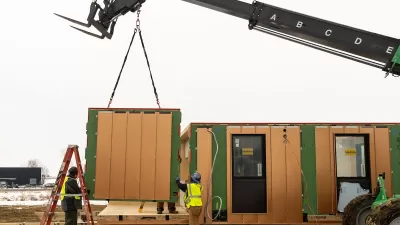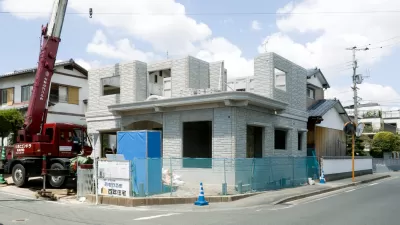A new study out in JAPA this week details the fire codes, zoning codes, subdivision regulations, etc., that prevent manufactured housing from being built.
Casey J. Dawkins and Theodore Koebel of the Metropolitan Institute at Virginia Polytechnic Institute and State University argue that manufactured housing could very useful in creating affordable housing, but the deck is stacked against it.
From JAPA: "The potential for manufactured housing to expand the affordable housing supply in metropolitan areas depends on a variety of factors, several of which planners influence. Many places adopted restrictive or exclusionary regulations because manufactured housing units were perceived to be temporary structures that could be moved from site to site and to be suitable for rural areas or trailer parks but not for city neighborhoods. Despite improvements in the quality and visual appeal of manufactured housing, restrictive land use and design regulations in urban and suburban jurisdictions limit the number of locations where manufactured housing can be placed, impose additional onsite installation standards and other design requirements that do not pertain to site-built units, and, in some cases, continue to prohibit the use of manufactured housing units altogether."
FULL STORY: Overcoming Barriers to Placing Manufactured Housing in Metropolitan Communities

Planetizen Federal Action Tracker
A weekly monitor of how Trump’s orders and actions are impacting planners and planning in America.

Maui's Vacation Rental Debate Turns Ugly
Verbal attacks, misinformation campaigns and fistfights plague a high-stakes debate to convert thousands of vacation rentals into long-term housing.

Restaurant Patios Were a Pandemic Win — Why Were They so Hard to Keep?
Social distancing requirements and changes in travel patterns prompted cities to pilot new uses for street and sidewalk space. Then it got complicated.

In California Battle of Housing vs. Environment, Housing Just Won
A new state law significantly limits the power of CEQA, an environmental review law that served as a powerful tool for blocking new development.

Boulder Eliminates Parking Minimums Citywide
Officials estimate the cost of building a single underground parking space at up to $100,000.

Orange County, Florida Adopts Largest US “Sprawl Repair” Code
The ‘Orange Code’ seeks to rectify decades of sprawl-inducing, car-oriented development.
Urban Design for Planners 1: Software Tools
This six-course series explores essential urban design concepts using open source software and equips planners with the tools they need to participate fully in the urban design process.
Planning for Universal Design
Learn the tools for implementing Universal Design in planning regulations.
Heyer Gruel & Associates PA
JM Goldson LLC
Custer County Colorado
City of Camden Redevelopment Agency
City of Astoria
Transportation Research & Education Center (TREC) at Portland State University
Jefferson Parish Government
Camden Redevelopment Agency
City of Claremont





























